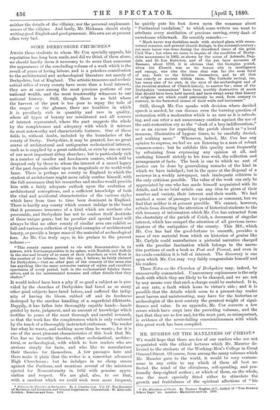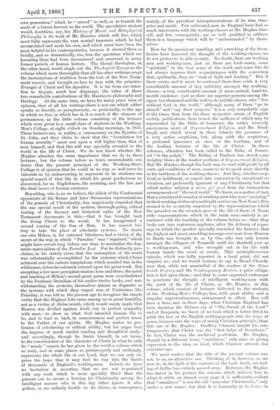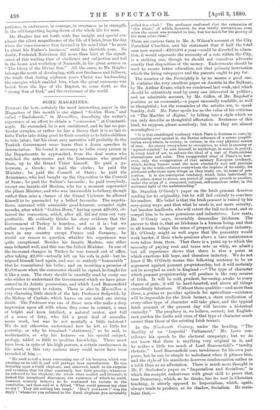MR. HUGHES ON THE MANLINESS OF CHRIST.* WE would hope
that there are few of our readers who are not acquainted with the ethical lectures which Mr. Maurice de- livered to the students of the Working-Men's College in Great Ormond Street. Of course, from among the many volumes which Mr. Maurice gave to the world, it would be very venture- some in any critic to say which of them all best re- flected the mind of the chivalrous, self-spending, and pro- foundly deep-sighted author ; or which of them, on the whole, was the most specially fitted either to stimulate the growth and fruitfulness of the spiritual affections of "his
• The Manliness of Christ. By Thomas Hughes, Q.C., Author of "Tom Brown's School Days," &o. London : Macmillan and Co. 1879. own generation," which he "served" so well, or to furnish the seeds of a future harvest to the world. The speculative student would, doubtless, say, his History of Moral and Metaphysical Philosophy is the work of Mr. Maurice which will live, which most fully represents the vast mental treasures which he had accumulated and made his own, and which must have been the most helpful to his contemporaries, because it showed them so lucidly, and so dramatically, too, how the questions which are haunting them had been encountered and answered in many former periods of human history. The liberal theologian, on the other hand, would single out the Theological Essays as the -volume which more thoroughly than all his other writings swept the incrustations of tradition from the text of the New Testa- ment records, and brought us face to face with the primitive Evangel of Christ and his Apostles. It is far from our inten- tion to dispute, much less disparage, the value of these two remarkable contributions of Mr. Maurice to philosophy and theology. At the same time, we have for many years been of opinion, that of all his writings there is not one which either speaks so directly, so perspicuously, so profoundly, to the age in which we live, or which has in it so much of the element of permanence, as the little volume consisting of the lectures which were given to a small class of students in the Working- Men's College, at eight o'clock on Sunday mornings, in 7856. These lectures are, in reality, a commentary on the Epistles of St. John, and they claim to shoNi that the "foundation for human morality" must rest upon a will higher than that of man himself, and that this will was specially revealed to the world in the life of Christ. We do not know whether Mr. Hughes attaches the same importance that we do to these lectures ; but the volume before us bears unmistakable evi- dence that the present principal of the Working-Men's College is of opinion that he could in no way so well serve its interests as by endeavouring to represent to its students one special aspect of that life in which his great predecessor re- discovered, for us Englishmen, the meaning, and the law, and -the final issues of human existence.
Beyschlag, who is, as we believe, the ablest of the Continental opponents of the Renal] and later Straussian representations of the genesis of Christianity, has sagaciously remarked that the one special result of the modern, thorough-going, critical testing of the literary and historical value of the New 'Testament documents is this,—that it has brought back the living Christ to the world. It has inaugurated a second coming of the Son of Man. It has caused his- tory to take the place of scholastic systems. No doubt our own Milton, in his outward blindness, had a vision of the secret of the way in which " Paradise " was "regained," which might have served long before our time to neutralise the dog- matic materialism of the Paradise Lost. For he distinctly pro- claims, in his stately verse, that the redemption of the world was substantially accomplished by the victories which Christ achieved over the various temptations which assailed him in the wilderness, before he solemnly entered upon his great work. But excepting a few more percipient readers here and there, the spirit and teaching of Milton's second great poem were overshadowed by the Puritanic literalism of his earlier twelve books, and not- withstanding the protests, themselves almost as dogmatic as the systems with which they waged war, of Unitarians like Priestley, it was left to the present age to recognise the simple verity that the Highest Life came among us in great humility, not as a victim of divine wrath, which would surely imply that Heaven was divided against itself, but in perfect sympathy with man,—to show us what God intended human life to be, and to lead us back, in consciousness and perfect trust, to the Father of our spirits. Mr. Hughes makes no pro- fession of scholarship or critical ability, but his pages bear the impress of much careful reading and thoughtful study ; and accordingly, though he limits himself, in set terms, to the consideration of the character of Christ in what he calls its " manly " aspect, he has given to the world a volume which so truly, and in some places so picturesquely and strikingly, wepresents the whole life of our Lord, that we can only ex- press the hope that it may find its way into the hands of thousands of England's working-men. Indeed, we have no hesitation in asserting that we are not acquainted with any work which is more specially fitted than the present one to secure a hearing for Christianity among the intelligent masses who in this day either ignore it alto- gether, or are sullenly hostile to its claims, in consequence, mainly, of the prevalent misrepresentations of its true char- acter and spirit. Few cultivated men in England have had so much intercourse with the working-classes as Mr. Hughes him- self, and few, consequently, are so well qualified to address them in a language which will be " understanded" by them- selves.
How far the persistent teaching and preaching of the Secu- larists have leavened the thought of the working-classes, we do not profess to be able to state. No doubt, there are working men and working-men, just as there are lords many, some "spiritual," in the best sense of the word, and some who do not always impress their acquaintances with the conviction that, spiritually, they are "men of light and leading." But if there exists, and it must be confessed there does exist, a very considerable amount of lazy infidelity amongst the working- classes—a very considerable amount of mere animal, hand-to- mouth existence—just as there are superior persons among the upper ten thousand and the well-to-do middle-classes who "live without God in the world," although many of them "go to church" and "say their prayers," it is a very remarkable sign of the times that from the three respective strata of English society, publications have issued the authors of which may be represented by the Duke of Somerset, the writer (scarcely anonymous now) of Supernatural Religion, and Mr. Brad- laugh, and which reveal in these Islands the presence of a very active scepticism, but, along with the scepticism, a profound ignorance at once of the teaching and of the leading features of the life of Christ. In these columns, attention has been called to the Duke of Somer- set "in the pulpit." The Bishop of Durham has struck some weighty blows at the weaker portions of Supernatural
But Mr. Hughes, though his book may be read with profit by all sorts and conditions of men, seems to us to speak more directly to his brethren of the working-classes. And they, whether scep- tical or indifferent, or scared into conversion by sensational re- vivalism, are profoundly ignorant of any Christianity but that which makes religion a satire qui peut from the tremendous arrangements of "the next world." We know, as a matter of fact, that a considerable number of working-men who were "assisting" in their working clothes at a midnight service one New Year's Eve, seemed to be so utterly surprised by the representations which the preacher on the occasion gave of the life of Jesus of Naza- reth—representations which in the main were entirely in ac- cordance with the teaching of the volume before us—that they broke out into rapturous applause, after the delivery of a pas- sage in which the speaker specially reminded his hearers that the highest and most ennobling message ever sent from Heaven to Earth was brought to us by One who was only known amongst the villagers of Nazareth until his thirtieth year as a working-man, and who wrought out in his life with human hands the creed of creeds. This midnight-service episode, which was fully reported in a local print, did not surprise us ; and we would venture to say to Broad Church- men that, while not unmindful of the readers of the Nine- teenth Century and the Contemporary Review, a prior obliga- tion is laid upon them,—and that is, some organised endeavour to penetrate the thought of intelligent working-men with the spirit of the life of Christ, as Mr. Hughes, in this volume, which consists of lectures delivered to the students of the Working-Men's College, has, with great ability and a singular unpretentiousness, endeavoured to effect. Men wil/
have a hero, and in these days, when Christian England has been shouting the Hebrew cry of "The Sword of the Lord"
and of Benjamin, we know of no book which is better fitted to
guide the feet of the English working-people into the ways of peace, because into the ways of manly Christian principle, than this one of Mr. Hughes. Geoffrey Chaucer taught his con- temporaries that Christ was the " first fadyr of Gentilesse." In fact, Christ was the medimval gentleman. Mr. Hughes, though by a different term, "manliness," only aims at giving expression to the idea, or ideal, which Chaucer uttered, five centuries ago.
We must confess that the title of the present volume was not, to us, an attractive one. Thinking of it, however, as we now do, in the light of the contents of the book itself, our feel- ing of dislike has entirely passed away. Moreover, Mr. Hughes has stated in his preface the reasons which induced him to
adopt it, while on almost every page it is sufficiently evident that " manliness " is not the old "muscular Christianity," only under a new name ; but that it is humanity at its best,—in
patience, in endurance, in courage, in sweetness as in strength, in the self-forgetting laying-down of the whole life for man.
Mr. Hughes has set forth with fine insight and special em- phasis the silent magnificence of the life of Christ, from the day when the consciousness first dawned in his mind that "he must be about his Father's business," until his thirtieth year. No doubt, Frederick Robertson did more than hint at the signifi- cance of this waiting time of obedience and subjection and toil in the home and workshop of Nazareth, in his great sermon on "The Glory of the Divine Son." All the same, to Mr. Hughes belongs the merit of developing, with new freshness and fullness, the truth that during eighteen years Christ was husbanding the energies which enabled him, when the great summons was heard from the lips of the Baptist, to come forth as the "strong Son of God," and the overcomer of the world.




































 Previous page
Previous page